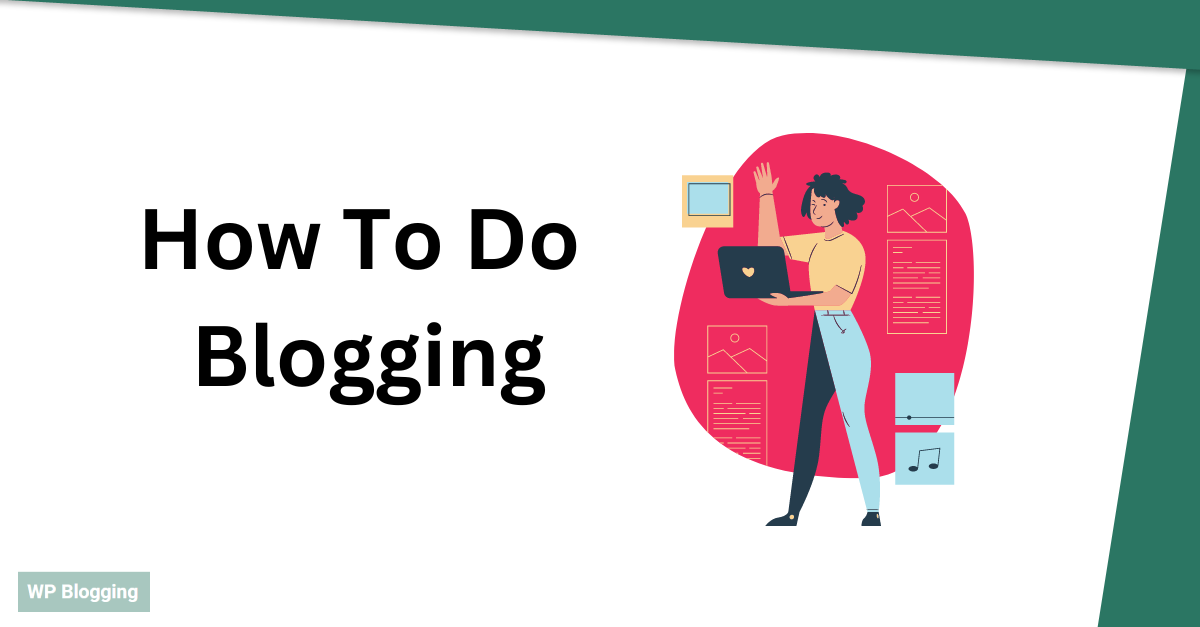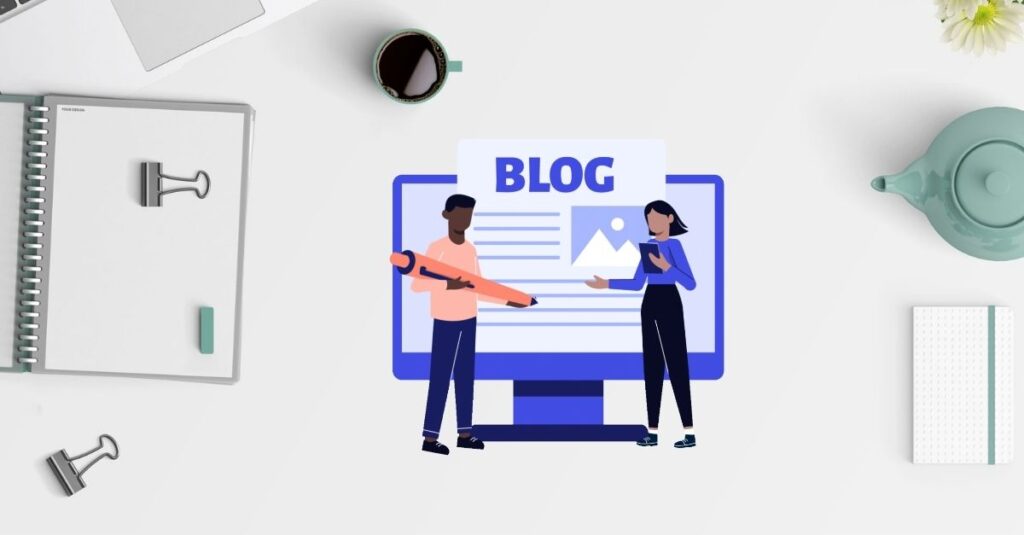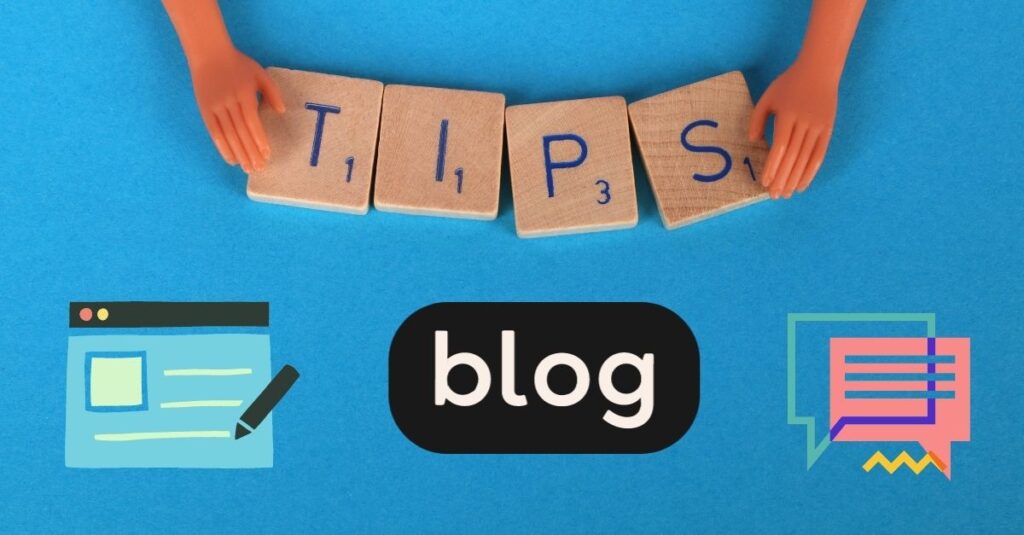
Are you searching for a user-friendly guide that can help you in learning How to Do Blogging? You can find a step-by-step guide on this webpage that will enable you to create a blog in just half an hour, even if you have minimal computer skills.
Once you have completed this guide, you will have an attractive blog that is ready to be shared with a larger audience.
This beginner-friendly guide will provide you with comprehensive assistance throughout every step, and the use of visual aids like pictures and videos will ensure absolute clarity.
So let us get started.
Table of Contents
ToggleHow to Start a Blog in 6 Steps
Starting a blog is an excellent way to express yourself, share your knowledge and experience, and connect with others who share your interests. Here are six simple steps to help you start a blog:
- Choose a blogging platform: There are various blogging platforms available, such as WordPress, Blogger, Tumblr, etc. Choose the one that best fits your needs and budget.
- Choose a domain name: A domain name is the address of your blog on the internet. Choose a name that reflects the content of your blog and is easy to remember.
- Choose a web host: A web host is a service that stores your blog on a server and makes it accessible to people on the internet. Choose a reliable web host that fits your budget.
- Install your blogging platform: If you are using a self-hosted blogging platform such as WordPress, you will need to install it on your web host. If you are using a hosted platform such as Blogger or Tumblr, you can skip this step.
- Customize your blog: Choose a theme that suits your blog's content and customize it by adding your own logo, images, and widgets.
- Start creating content: Once your blog is set up and customized, you can start creating content that appeals to your audience. Write high-quality, engaging blog posts and publish them regularly to keep your readers engaged.
By following these six steps, you can easily start a blog and build a loyal following of readers who share your interests.
Remember to always stay true to your unique voice and perspective, and to create content that provides value to your readers. Good luck with your blogging journey!
What is a Blog?
A blog is a website or an online platform where an individual or a group of individuals share their opinions, knowledge, experiences, and ideas on various topics with their readers.

A blog is typically updated regularly with new content in the form of articles or posts, which are arranged in reverse-chronological order, with the most recent posts appearing first.
Blogs can cover a wide range of topics, from personal experiences and opinions to news, technology, business, travel, lifestyle, and more.
Blogging allows individuals to express themselves, share their knowledge, and connect with a wider audience through comments and social media.
Are you prepared to begin your blogging journey? Let's initiate the process with easy-to-follow steps:
How To Setup a Successful Blog In an Easy Way?
While the idea of setting up a blog may seem overwhelming, the good news is that it doesn't have to be.
In this section, we'll walk you through the process of setting up a successful blog in an easy-to-follow steps.
So let's start with.
Step 1: Choose a platform
Before you can start blogging, you'll need to choose a platform to host your blog. Some popular options include WordPress, Wix, and Squarespace.
Consider your needs and preferences when choosing a platform – for example, if you want a lot of flexibility in terms of design and functionality, WordPress might be the best choice for you.
Step 2: Choose a domain name
Your domain name is the web address for your blog (for example, myblog.com). Choose a name that reflects the topic of your blog and is easy to remember and spell.
You can purchase a domain name through your blogging platform or through a domain registrar like GoDaddy.
Step 3: Choose a hosting service
A hosting service is where your blog will live on the internet. Some popular hosting services include Bluehost and SiteGround.
Consider factors like price, uptime, and customer support when choosing a hosting service.
Step 4: Install your blogging platform
Once you've chosen your platform and hosting service, you'll need to install your blogging platform.
Most hosting services offer one-click installation for platforms like WordPress, so this step should be relatively straightforward.
Step 5: Customize your blog
Now it's time to customize your blog to your liking! Choose a theme that reflects your personality and the topic of your blog, and add pages, menus, and widgets as needed.
Many platforms offer drag-and-drop interfaces that make it easy to customize your blog even if you don't have any coding experience.
Step 6: Create your first post
With your blog set up and customized, it's time to start creating content! Write your first post, and add images and videos as needed to make it engaging and visually appealing.
Step 7: Promote your blog
Once you've published your first post, it's time to start promoting your blog. Share it on social media, join blogging communities and groups, and engage with other bloggers in your niche.
Building relationships with other bloggers and promoting your content can help you grow your audience and establish authority in your field.
Setting up a blog can seem overwhelming at first, but with the right guidance and resources, it's a manageable process.
How to Do Blogging: Tips to Improve Your Writing
Writing a blog can be a fun and fulfilling experience, but it can also be challenging to consistently produce high-quality content.

I have compiled a list of tips based on my personal writing experience to assist you in enhancing your blog writing for your ease and convenience.
By following these tips, you can improve your blog writing and create content that engages and resonates with your readers.
1. Define Your Target Audience
Before you start writing, it's important to know who you're writing for. Define your target audience based on factors like age, gender, interests, and education level. This will help you tailor your content to your readers and make it more engaging and relevant to them.
2. Use a clear and concise writing style
Avoid using complex sentence structures or jargon that may be difficult for your readers to understand. Use short sentences and paragraphs to break up your content and make it easier to read. And be sure to use active voice instead of passive voice whenever possible.
3. Choose a strong headline
Your headline is the first thing your readers will see, so it's important to make it attention-grabbing and informative. Use strong, descriptive words and phrases that accurately reflect the content of your post.
4. Use visuals
Adding images or videos to your blog posts can make them more engaging and memorable. Choose visuals that are relevant to your content and visually appealing to your readers.
5. Write with SEO in mind
Search engine optimization (SEO) can help your blog posts rank higher in search engine results pages. Use keywords in your post title and throughout your content, and use header tags to break up your content and make it more readable.
6. Edit and proofread your content
Before publishing your post, be sure to edit and proofread it for spelling and grammar errors. You may also want to have someone else read your post to get feedback and catch any mistakes you may have missed.
7. Be authentic and consistent
Finally, remember that your readers are interested in hearing your unique perspective and voice. Be authentic in your writing, and strive to be consistent in your posting schedule and overall content strategy.
5 Reasons You Should Start a Blog
If you're wondering how to do blogging, here are some reasons why you should start a blog:
- Build your personal brand: Blogging is a great way to showcase your expertise and build your personal brand. By sharing your knowledge and insights on a particular topic, you can establish yourself as a thought leader in your field.
- Share your passion: Blogging allows you to share your passion with others. Whether you're interested in cooking, travel, or technology, there's an audience out there that shares your interests and wants to hear what you have to say.
- Connect with others: Blogging can help you connect with like-minded individuals and build a community around your interests. You can engage with your readers through comments, social media, and email, and build relationships with people from all over the world.
- Improve your writing skills: Writing is a skill that takes practice, and blogging is a great way to improve your writing skills. By consistently producing content, you can hone your writing style and develop your voice as a writer.
- Generate income: While blogging shouldn't be seen as a get-rich-quick scheme, it can be a source of income if you approach it strategically. By monetizing your blog through advertising, affiliate marketing, or selling digital products, you can earn money doing something you love.
So if you're wondering how to do blogging, these are just a few reasons why you should consider starting a blog.
With dedication and hard work, you can create a platform that allows you to share your knowledge, connect with others, and potentially even earn income.
5 Reasons You Should Not Start a Blog
Certainly! Here are some personalized reasons why you may not want to start a blog:
- Time constraints: If you already have a busy schedule with work, school, or family responsibilities, you may not have enough time to consistently create and promote content for your blog. Starting a blog requires a significant time commitment, and if you can't make that commitment, it may not be the right choice for you.
- Limited audience: Depending on your topic and niche, it can be difficult to attract a significant following for your blog. If you're not prepared to put in the effort to grow your audience through social media, email marketing, and other tactics, you may not see the results you're hoping for.
- Financial investment: While it's possible to start a blog for free, if you want to take it to the next level, you may need to invest in things like web hosting, design, and advertising. If you're not prepared to invest some money into your blog, it may be difficult to achieve your goals.
- Lack of inspiration: Writer's block can be a real challenge for bloggers, especially if you're trying to produce content on a regular basis. If you're not comfortable with the idea of consistently producing content and coming up with new ideas, blogging may not be the right choice for you.
- Criticism and negativity: Unfortunately, the internet can be a harsh place, and bloggers often face criticism and negativity from readers and other bloggers. If you're not prepared to handle criticism or deal with negative comments, blogging may not be the right choice for you.
While there are certainly many benefits to starting a blog, it's important to consider these potential challenges before diving in.
If you feel that the time commitment, financial investment, or potential criticism may be too much for you to handle, it may be better to focus your energies elsewhere.
Which Blogging Tools Should I Use?
As a blogger myself, I can recommend some personalized blogging tools that you may find helpful in launching your blog.

Content Management System (CMS)
A CMS is essential for managing your blog content. It allows you to create and publish posts, manage your media library, and customize your blog's design and functionality.
WordPress is one of the most popular CMS options, with a wide range of customization options and plugins available.
Other popular CMS options include Blogger and Squarespace, which are user-friendly and require little technical knowledge.
Grammar and Spelling Checkers
A blog with grammatical and spelling errors can be unprofessional and can turn off readers. Grammarly and Hemingway Editor are two tools that can help you catch errors and improve the readability of your writing.
Grammarly is a powerful writing assistant that checks for grammar, spelling, and punctuation errors. Hemingway Editor, on the other hand, focuses on improving the readability of your writing by highlighting sentences that are difficult to read.
Social Media Scheduling Tools
Social media is an important aspect of promoting your blog and engaging with your readers.
Hootsuite and Buffer are two popular tools that allow you to schedule and manage your social media posts across multiple platforms.
They also provide analytics to help you measure the success of your social media campaigns.
Analytics Tools
Analytics tools such as Google Analytics can help you track your blog's performance and measure your success.
You can see how many people are visiting your blog, where they're coming from, and how long they're staying on your site.
This information can help you make data-driven decisions about how to improve your blog and increase your traffic.
Design Tools
A visually appealing blog can keep readers engaged and make your content more shareable.
Canva and Adobe Creative Suite are two design tools that can help you create graphics and images for your blog.
Canva is a user-friendly design tool that offers a wide range of templates, graphics, and fonts.
Adobe Creative Suite is a more powerful tool that allows you to create professional-grade designs for your blog.
Email Marketing Tools
Building an email list is an effective way to keep your readers engaged and informed about your blog.
Mailchimp and ConvertKit are two email marketing tools that can help you create and manage your email campaigns.
They allow you to create email templates, automate your email campaigns, and measure the success of your email campaigns.
Backup and Security Tools
It's important to keep your blog secure and backed up in case of any issues or data loss.
Jetpack and UpdraftPlus are two tools that can help you back up your blog and protect it from security threats.
Jetpack is a plugin that offers a suite of security and backup tools, while UpdraftPlus is a standalone backup plugin that allows you to back up your blog to the cloud.
Overall, these tools can help you manage your blog more efficiently, create more engaging content, and grow your audience.
Conclusion On How to Do Blogging
As you can see, starting a blog is not as difficult as it may seem at first. By following the steps we have outlined in this post on How to Do Blogging and utilizing the blogging tools we have recommended, you can create a successful and engaging blog that resonates with your audience.
Blogging requires consistency, dedication, and a willingness to learn and grow. However, the rewards of blogging are well worth the effort.
You can establish yourself as an authority in your niche, connect with like-minded individuals, and even make a living through your blog.
Remember, the key to successful blogging is to create content that is valuable, informative, and entertaining for your readers.
With these tips and tools, you have everything you need to start your blogging journey and make your mark in the digital world.
That concludes my “How to do Blogging” guide, which is based on my own personal experience. If you have any questions or require further assistance, please feel free to leave a comment below.
Good luck and happy blogging!
Frequently Asked Questions
How do I start a blog for free?
To start a blog for free, choose a blogging platform like WordPress or Blogger, select a domain name, set up your blog, and customize it to fit your needs. It's that easy!
How do bloggers make money?
Bloggers can make money through various ways like advertising, affiliate marketing, sponsored content, selling digital or physical products, or offering services related to their blog's niche. By creating valuable content and building a loyal audience, bloggers can monetize their blogs and turn them into profitable businesses.
What should I write about on my blog?
When deciding what to write about on your blog, choose a topic that you are passionate about and knowledgeable about. Consider your target audience and create content that provides value, solves problems, or entertains. Research your niche and competitors to find gaps and opportunities, and always stay true to your brand's message and voice.
How often should I post on my blog?
There is no set rule for how often you should post on your blog, but it's important to maintain a consistent publishing schedule that works for you and your audience. It's better to post high-quality content less frequently than to post low-quality content frequently. Consider your niche, audience, and resources when deciding on a posting frequency, and aim to provide value with every post.
What are the benefits of blogging?
Blogging has numerous benefits, including building credibility and authority in your niche, growing a loyal audience, improving writing skills, providing a platform for self-expression and creativity, and potentially generating income. It's also a great way to connect with like-minded individuals and share your passions with others.
How do I get traffic to my blog?
To get traffic to your blog, you need to produce high-quality, engaging content, optimize your blog for search engines, promote your blog on social media, guest post on other blogs, and participate in online communities related to your niche. Additionally, building an email list and using paid advertising can also drive traffic to your blog.
What are the best blogging platforms?
Some of the best blogging platforms include WordPress, Blogger, Medium, Wix, Squarespace, and Ghost. Each platform has its own strengths and weaknesses, and the best one for you will depend on your specific needs and goals. For example, WordPress is a highly customizable and popular platform
What are some common mistakes new bloggers make?
Common mistakes new bloggers make include a lack of consistency, ignoring SEO, focusing too much on monetization, ignoring design and user experience, and failing to engage with their audience. It's important for new bloggers to prioritize creating quality content, building an audience, and providing a good user experience, rather than solely focusing on making money.